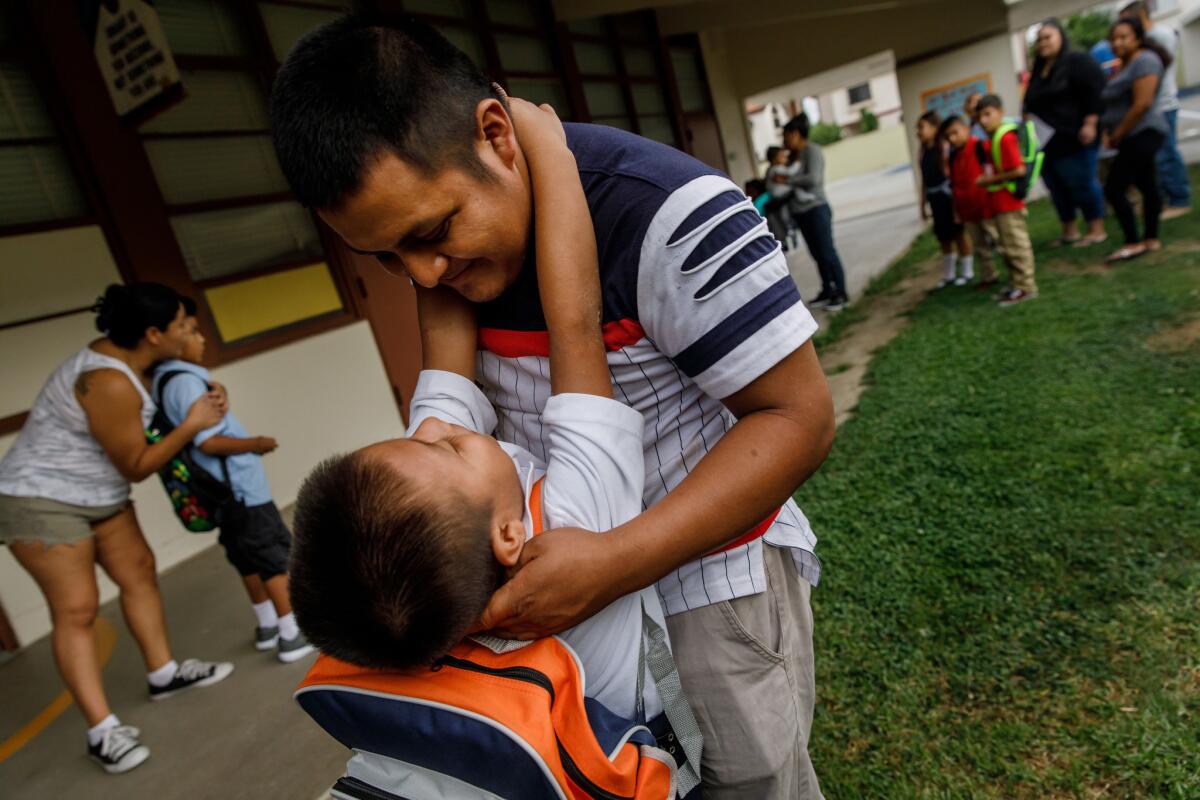Reunited after being split up at the border, Guatemalan father and son work through trauma alone

His days are spent inside a tiny shack wedged behind a commercial building. An air conditioner hums in vain from the window, and any knock at the door makes him jump.
Hermelindo Che Coc’s child was returned to him nearly two months ago. They were separated at the border and kept apart for 46 days.
On the three occasions that they were able to talk on the phone, Jefferson Che Pop cried to his father, “Papa, where are you? You don’t love me anymore?”
Father and son were among nearly 2,600 families split apart by the Trump administration’s “zero tolerance” policy on border enforcement. Now, like so many who have been reunited, they’re left to work through the trauma of that separation alone.
Just turned 7, Jefferson can lose himself in cartoons, in popsicles and sticks of bubble gum.
Che Coc has no such easy comfort. His fight for their political asylum may take years. It could be months before he is allowed to work legally.
In this huge city such a world away from his Guatemalan village, often everything feels daunting.
“Wherever we go, we must be careful,” Che Coc said. “Everyone is in a hurry and there’s lots of cars. The pilots go very fast, and I never know if they see me and my boy.”
The day Che Coc reunited with his son, Jefferson was thinner and his eyes were hollow. He had a cough and a runny nose. Dry, itchy bumps covered his body.
When Che Coc swept him up in his arms, the boy was limp and silent. Weeks later, he would say, “Papa, I didn’t know who you were.”
Jefferson doesn’t like to talk about the days they spent apart. His father follows his lead.
“I’m sorry,” Che Coc says simply, over and over. “You are with me now.”
After the two were detained in late May crossing the border near El Paso, Jefferson was taken to a New York detention shelter with nearly 300 separated kids. He spent weeks thinking his father had died.
Now and then, when the two are alone — lying in bed or walking to a nearby park — Jefferson opens up about New York.
He talks about Osmin, a young boy he befriended at the shelter, and how when Osmin left he cried for days.
One day, all the kids were told to race as fast as they could in a circle. Jefferson said he won first place.
Every morning, a woman would come and take them to school. They would walk, then get on a bus — or, sometimes, a train.
“A train?” Che Coc asks. “Trains cut people in half. Thank God this train did not hurt you.”
Since Jefferson’s return, the two mostly speak in Spanish, which Jefferson picked up in New York when no one understood his Mayan Q’eqchi’.
Che Coc is proud of his son for learning.
“He struggled,” he said. “But my boy has a heart that does not give up.”
In the small space they now share with Papa Chinto, Jefferson’s grandfather, the boy clings to his father — and vice versa.
They sleep in the same bed, bathe together, eat every meal from the same dish. If Che Coc doesn’t eat, neither does Jefferson.
“Even when I’m not hungry, I must eat,” Che Coc said.
The rash still covers Jefferson’s arms and neck. But his cheeks are fuller now. He’s curious and wiggly and quick to smile.
“Mi niño esta feliz, esta bien,” Chec Coc said as Jefferson sat on his lap, playing a video game on Papa Chinto’s old cellphone. “My boy is happy, he’s good.”
On a recent Saturday morning, the two came home from the laundromat beat from the afternoon sun. Che Coc carried a big sack full of clean clothes on his shoulder. The paved lot outside their home was decked for a wedding, with fake roses, linen-covered tables and a purple and white circus canopy.
Jefferson ran his fingers across the tablecloths before slipping into their shack. As his father folded the laundry in their bedroom, Jefferson settled on the tile floor, on his belly. He grabbed his notebook and crayons and began to color.
He drew the same picture three times: a little house with a long, winding path leading from the front door.
He lifted the notebook to show his father. “What do you think? Is it ugly or is it beautiful?”
“It’s beautiful,” Che Coc told him.
Back in their village of La Ceibita in rural northern Guatemala, life was far simpler.
Jefferson’s school had only two classrooms and about 30 students between them. Che Coc worked in the cornfields, and his wife, Margarita, stayed home and looked after their 3-year-old and newborn.
There were dangers there, too, but different ones than in the big city.
“People would get killed for no reason as they were going about their day,” Che Coc said.
He and Jefferson left in the spring with 1,000 quetzales, about $133. Che Coc’s hope was to find work, enroll his son in school and eventually get permission to bring the rest of the family.
“Only leave the house if you have to,” he told Margarita. “If you do, go with relatives."
Here in Los Angeles, Che Coc’s attorneys are still trying to piece together the details of the 31-year-old’s case. They believe that when Che Coc was detained by U.S. Customs and Border Protection, he may have unknowingly signed an expedited removal, which initiated deportation proceedings before he could apply for asylum, a protection granted by international law.
He’s scheduled to appear before an Immigration and Customs Enforcement officer in October. He wears an ankle monitor and has to report to ICE regularly. And still he knows he could at any moment be scooped up and sent home.
Every day he is anxious. He struggles not to panic each time a stranger approaches.
“I know God is protecting us,” he said. “But I worry someone will try to trick us or hurt us.”
He worries most about Jefferson, who can’t stay by his side at all times. He has to go to school, this time with nearly 900 students.
When Che Coc visited the campus for a tour, he took comfort in its tall gates.
Jefferson was taken with a vibrant mural splashed on a wall.
“This is where you’re going to play and make new friends,” Che Coc told him, pointing to a playground a few feet from his son’s classroom.
On the first day of school, father and son woke before sunrise.
Jefferson lay on the bed as Che Coc helped him put on his blue pants and collared white shirt. Che Coc sprayed him with his musky men’s cologne and tied his shoe laces for him.
The school knew all about the family’s circumstances and already had gone to great lengths to lend a hand.
An outreach worker had driven them to get free school uniforms. He had taken them to a community center to make sure Che Coc knew about the free dental and medical services available to Jefferson. The principal had given them books, and the local school district’s superintendent had visited their home, carrying a new backpack embroidered with the second-grader’s name.
Che Coc was overwhelmed by the support. For weeks, he had worried that he wouldn’t be able to buy the things his son needed. His attorneys launched a fund in his name after he and Jefferson were reunited, but he had limited access to the money without a bank account.
“It’s frustrating,” he said. “By now I should have been working, I should have been helping my family. Instead the days go by and I sit here unable to do anything.”
As they began their walk to school, Jefferson let go of Che Coc’s hand and skipped ahead, his orange backpack swaying left and right.
He stopped in front of a car to study his reflection in the glass, then cracked a proud grin.
They made their way down a long drag dotted with shoe factories, then turned onto a street full of small homes with chain-link fences and cascading bursts of bougainvillea.
Along the way, Che Coc reminded Jefferson: You need to listen to your teacher. You need to do your homework and learn.
“We’re on borrowed land,” he said. “I know there are people that don’t want us here, but I hold nothing against them. I just want to see my son be safe and triumph.”
Outside the school, faculty and staff holding signs and balloons formed a line to cheer on the kids.
Che Coc took off his baseball cap and, misty eyed, went down the line shaking each person’s hand.
Father and son walked into the classroom together, but Jefferson quickly took a seat at a table. He watched a classmate hang his backpack on the back of his little blue chair.
“Papa,” he said. “Can you hang my backpack like that, too?”
Che Coc had planned to linger outside the school for several hours, just in case Jefferson needed him.
Instead, he kissed his son goodbye, left the classroom and walked away through the school’s tall gates.
esmeralda.bermudez@latimes.com
Twitter: @LATBermudez
Sign up for Essential California
The most important California stories and recommendations in your inbox every morning.
You may occasionally receive promotional content from the Los Angeles Times.









